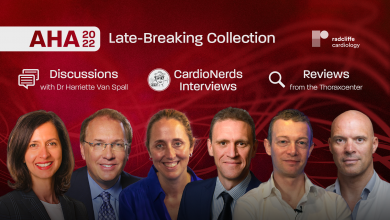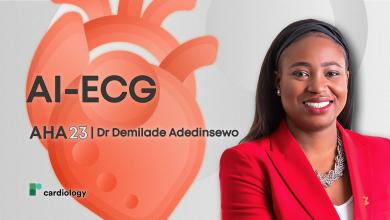Search results
Author(s):
Jack C Barton
,
Juan Carlos Kaski
Added:
2 years ago
Author(s):
Alexandros Klavdios Steriotis
,
Sanjay Sharma
Added:
3 years ago
Hypertrophic cardiomyopathy (HCM) is a hereditary primary myocardial disease that is most commonly caused by mutations within genes encoding sarcomeric contractile proteins and is characterised by left ventricular hypertrophy in the absence of a cardiac or systemic cause.1,2 The condition is inherited as an autosomal dominant trait and has a prevalence of one in 500.3,4 Marked genetic…
View more
AHA 22 Late-Breaking Science Coverage
Video Series
Author(s):
Mauro Chiarito
,
Luca Luceri
,
Angelo Oliva
,
et al
Added:
1 year ago
Author(s):
Peter P Swoboda
,
Adam K McDiarmid
,
Stephen P Page
,
et al
Added:
3 years ago
Inherited cardiomyopathies are primary disorders of the heart muscle that have a genetic basis. On long-term follow-up they are associated with adverse outcomes, particularly sudden death, arrhythmia and heart failure.1 The diagnosis is made on the basis of clinical, cardiac imaging (primarily with transthoracic echocardiography) and genetic features,2 ideally by a tertiary inherited cardiac…
View more
Author(s):
Alexandros Protonotarios
,
Perry Elliott
Added:
3 years ago
Until the 20th century, conventional medicine relied almost exclusively on observable characteristics to classify and treat human disease.1 Even in the modern era, physicians define diseases using phenotypic similarities and employ relatively simple algorithms to interpret diagnostic tools and plan treatment. The advent of low-cost genetic sequencing and its introduction into clinical care…
View more
Author(s):
Prabhakar Rajiah
,
Milind Y Desai
Added:
3 years ago
Magnetic resonance imaging (MRI) has become an important non-invasive imaging modality in the evaluation of cardiovascular diseases because of advances in scanner hardware, coil technology, parallel-imaging techniques and MRI sequences, all of which facilitate the rapid acquisition of high-quality images. Several scientific studies validated the use of MRI in cardiovascular diseases and showed…
View more
Obesity and Weight Loss
Author(s):
C Richard Conti
Added:
3 years ago
Article
Author(s):
Demilade Adedinsewo
Added:
5 months ago
AHA 23 - We are joined by Dr Demilade Adedinsewo (Mayo Clinic, US) to discuss the findings from a study investigating the effectiveness of an artificial intelligence-enabled ECG (AI-ECG) for cardiomyopathy detection in an obstetric population.In the intervention arm, the digital stethoscope correctly identified 92% of those with ejection fraction <50% and 100% of those with ejection fraction …
View more
Author(s):
Philip A Poole-Wilson
Added:
3 years ago
Angina pectoris is a symptom that is usually, in the developed world, caused by obstruction to the coronary arteries by the enlargement of atheromatous lesions; there are other causes. The symptom can limit lifestyle, but more importantly is a repetitive reminder to the patient of the presence of heart disease, causing continual anxiety because of the belief that angina is the portent of early…
View more















 « First
« First